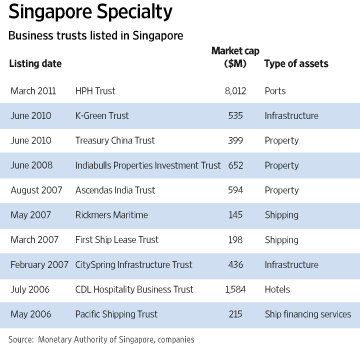HONG KONG (Dow Jones Investment Banker) – PCCW Ltd.’s hope of spinning off its telecommunications business into Hong Kong’s first listed business trust were shattered when the Stock Exchange of Hong Kong’s listing committee rejected the application. The decision, revealed last week by PCCW, reinforces the SGX’s lock on this type of security, and the temptation for Hong Kong to lure this class of listing away from Singapore must have been intense. But PCCW’s plan raised troubling corporate governance issues.
HKEx did not publicly state its reasons, and the company was equally coy in providing details. But the recent listing in Singapore of Hutchison Port Holdings Trust, which has remained below its IPO price since start of trading in March, may provide some clues. HPH is part of the business empire of Li Ka-shing, the father of Richard Li, the chairman of PCCW.
(Click HERE for PCCW’s response to HKEx’s decision on 27 April 2011).
HPH Trust floated 62% of its shares in its US$5.45 billion IPO, the largest globally so far this year, with 29.6% going to eight cornerstone investors, which were not subject to a lock up. As all the shares making up the over-allotment option were bought back by joint bookrunner Deutsche Bank to stabilize trading, the greenshoe could not be exercised, and incumbent shareholder Hutchison Whampoa Ltd. now indirectly owns 27.6% of the trust. Singapore’s port operator PSA also has a 10.4% stake.
This is less than ideal from a governance standpoint because, under Singapore’s Business Trust Act of 2004, shareholders need a 75% majority to remove HPH Trust’s trustee-manager (indirectly owned by Hutchison Whampoa) or to effect management changes. In Hong Kong, by contrast, only 50% is required for listed corporates. Under the Singapore rules, then, a significant minority shareholder can reap the benefits of a flotation by way of a business trust, while still keeping a tight grip and control over its board and assets.
HKEx’s listing committee may well have taken the view that the interests of minority shareholders were not sufficiently safeguarded under the proposal put forward by PCCW, which is 27.1% owned by tycoon Richard Li.
Like common law trusts, business trusts (BTs) are not separate legal entities. A trust’s trustee-manager has legal ownership over the assets, which it manages for the benefit of unit holders. HKEx may also have been concerned about one entity assuming both roles. By contrast, REITs – which are allowed in Hong Kong – have separate managers and trustees.
A final complicating factor that may have concerned HKEx is the question of PCCW’s ongoing viability as a listed company after spinning off 90% or more of its operations in a business trust IPO.
HKEx’s decision means that, for now, Singapore will continue to have a monopoly on the structure, which has so far been adopted to set up and list 10 business trusts, most in the shipping and infrastructure industries. PCCW has said it disagrees with HKEx’s conclusions and will appeal. But don’t be surprised if it now transplants its plans to Singapore.

More candidates for business trusts are lining up in the Lion city: India’s Singh brothers, who control Fort is Group, have reportedly appointed Citi, Nomura, RBS, Religare and Standard Chartered to lead an IPO, said to be of US$500 million, to spin off health care assets. Perennial China Retail Trust, meanwhile, has started bookbuilding for its relaunched IPO of China retail assets, to raise up to US$680 million through Citi, DBS, Goldman Sachs and Standard Chartered.
It looks like investment bankers in Singapore will, for some time to come, hold the keys to the stable – and help tycoons in Asia milk the business trust cash cow.
(Philippe Espinasse worked as an investment banker in the U.S., Europe and Asia for more than 19 years and now writes and works as an independent consultant in Hong Kong. Visit his website at https://www.ipo-book.com. Readers should be aware that Philippe may own securities related to companies he writes about, may act as a consultant to companies he mentions and may know individuals cited in his articles. To comment on this column, please email [email protected]).
[This article was originally published on Dow Jones Investment Banker on 2 May 2011 and is reproduced with permission. It also appeared on WSJ.com, the website of The Wall Street Journal].
Copyright (c) 2011, Dow Jones & Company, Inc.
